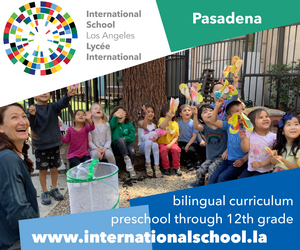Building a Resilient Family: Why Resilience is More Important than Ever

We talk a lot about why resilience is an important trait to support in children; how it helps children to grow up ready to take on challenges with a problem-solving mentality that studies show will result in healthier relationships, more fulfilling careers, and contribute to an overall sense of happiness and well-being. As we are presented with new challenges in the midst of this difficult time in history, building a resilient family is more important than ever.
We recently welcomed Dr. Elisa B. Fuller from UCLA’s Nathanson Family Resilience Center to our West Los Angeles campus to talk to our parents about ways that they can foster resilience in their children from an early age. Dr. Fuller works with families who have experienced trauma, helping to give them tools to work through their significant challenges in order to create a stronger family foundation that will help them thrive in their futures. She shared with us some helpful tips, which we will share with you, along with some essential resources that you and your family can refer to during this time.
First of all, what is resilience?
• The American Psychological Association says it is “the process of adapting well in the face of adversity, trauma, tragedy, threats or even significant sources of stress.”
• PostivePsychology.com says “A resilient person works through challenges by using personal resources, strengths and other positive capacities of psychological capital like hope, optimism, and self-efficacy.”
In a nutshell, resilience is a trait that we build through our encounters with the many stressors we encounter in life. Therefore teaching our children how to successfully cope with stress is a significant way that we can help them to establish resilience. Dr. Fuller described three escalating types of stresses our children will generally experience.

As a parent you are already well aware that your children often model their behavior after yours. Therefore it will likely come as no surprise that the way you handle stress will be an important indicator of how your child will also likely manage their stress. Dr. Fuller emphasized that the impact of toxic stress on a parent over time can lead to a serious negative impact upon their family, “reducing family closeness, support, and resilience.” The good news is that in working on our own ability to manage stress in our lives we can create a positive outcome for our entire family.
Of course our children have their own temperaments which are unique to them and there are several other factors that can contribute to difficulties in managing stress. What can you do to help you and your child manage stress more effectively?
The three key contributing factors to help us manage stress and build resilience, according to Dr. Minh-Chau Do from UCLA’s Nathanson Family Resilience Center, are:
1. Emotion Regulation
2. Communication, and
3. Positive Parent-Child Relationships
Additional contributors are: Social Support, Problem Solving Skills, Goal Setting, Positive Views of Self, and Cognitive Reappraisals.
Help Your Child Identify and Manage Their Emotions: Work on different techniques to help your child cope when their feelings are moving from calm and relaxed, towards anxious or angry. Using a feelings thermometer can be a great way for a child to recognize when their emotions are changing and moving up the thermometer. Ask questions: What things make your child feel comfortable and keep them in the green? What situations move them into the yellow and orange areas or make them feel angry and move them all the way into the red?

*Feelings Thermometer courtesy of Dr. Minh-Chau Do and the UCLA Nathanson Family Resilience Center
Discover Your Personal Stress Management Techniques: During this time where we are all at home together, managing our emotions can be a trying task for all of us. Have fun experimenting with stress management techniques together and help your child create a tool box for them to go to when they sense their feelings moving up the thermometer. Each child will have things that they respond to more than others. Some will respond to tactile things that they can touch and manipulate, while others may respond to breathing and counting, or physical exercise. You can try them all and come up with a toolbox filled with physical tools and flashcards of ideas that may work for your child.
Toolbox Ideas

Model Your Stress Management Techniques: Show your children the positive techniques that work for you, whether that be yoga, meditation, walking, or singing. When we encounter new situations that challenge us, sometimes we as parents need new ideas for managing stress too. Remember to take time to water your own tree first. Self care is essential.
Working with our children to find some effective tools to help them self regulate is also an ideal way to positively bond with our children, further contributing to open communication and development of a positive parent-child relationship. Teaching your child how to manage their emotions will help them to adapt to new situations, develop critical thinking skills, overcome and bounce back from challenges, and most importantly grow as a result of the experience. All of this will lead to a stronger family bond, a deeper sense-of-self, and a more promising future for our children.
Reach Out When You Need Help: Because we are living in an unprecedented time, the challenges are greater and we will inevitably need more help to get through them. Don’t be afraid to ask for help during this time. Your school leaders are here to help provide you with resources that can help you navigate this uncharted territory.
About Stratford School
We believe high expectations yield extraordinary results. Our advanced, innovative, intentionally balanced curriculum challenges students, accelerates their achievement, and prepares them for the future. Learn more at stratfordschools.com.



















